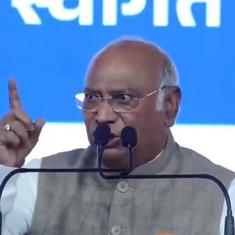Last month, the Bharatiya Janata Party-led government in Chhattisgarh launched the first phase of the Sanchar Kranti Yojana, a scheme to provide smartphones to more than 50 lakh families below the poverty line. According to the initiative, one phone will be provided per family and will be registered in the name of the female head of the house.
However, scheme documents accessed by Scroll.in show that the state has not only asked for the Aadhaar numbers (or enrolment numbers for those who do not have the 12-digit biometric ID yet) of applicants and their family members but also signatures giving the government consent to use those Aadhaar numbers. The documents do not explain why or how the government intends to use this information.
This has raised concerns about privacy and possible misuse of Aadhaar details ahead of Assembly polls later this year.

Aadhaar, the 12-digit unique identity number issued by the government, has been made mandatory for several government schemes even as its constitutional validity has been questioned in the Supreme Court. According to the Aadhaar Act, 2016, an individual’s Aadhaar number or biometric information cannot be “published, displayed or posted publicly, except for the purposes as may be specified by regulations.”
Beneficiaries who do not have Aadhaar or have not enrolled for the unique identity number can apply for the smartphone scheme through other documents such as passports or drivers licence. However, they will not be able to avail of certain additional benefits that those with Aadhaar can access, a senior government official said.
As on Wednesday, six lakh people had enrolled under the scheme, 80% using Aadhaar, the official said.
Consent concerns
A consultant with the Chhattisgarh Infotech Promotion Society, the government wing in charge of the project, told Scroll.in that the government planned to use the Aadhaar numbers to provide additional benefits to families enrolled in the scheme. “There are primarily two reasons for seeking consent for using the Aadhaar numbers of the family members of the applicants,” said the consultant, who did not wish to be identified. “Using the Aadhaar numbers, the government wants to provide DigiLocker facility to each member of the family through the same smartphone and later expand the scheme to cover direct benefit transfers.”
DigiLocker is a virtual locker launched by the Government of India that allows citizens to store official documents and certificates, such as drivers licences, school certificates and voter IDs, on the cloud, eliminating the need for hard copies. The locker is linked to an individual’s Aadhaar number.
When asked why a scheme to distribute mobile phones would need to initiate direct benefit transfers – under which subsidies or other government transfers are sent directly into a person’s bank account – the consultant said the government “will come up with more ideas with time”. He said the government is in talks with companies to provide e-wallets that can be accessed by all family members under one smart phone and mobile number.
Alex Paul Menon, the Chief Executive Officer of Chhattisgarh Infotech Promotion Society, said the consent was being sought so that applicants would not be harassed for their Aadhaar details on multiple occasions for various purposes.
“Under the draft of the Sanchar Kranti Yojana, the government has emphasised on consent for usage of any detail provided by the applicants. This is the only reason why we have asked for consent for using Aadhaar number of relatives of beneficiaries so that we can provide them with all possible benefits under the scheme,” said Menon.
However, activists are not convinced. “This [the signature clause] will naturally create concerns,” said Vipul Paikra, a civil right activist in Chhattisgarh. “Aadhaar has been in controversy for a long time and the government has not yet made public its intentions for seeking consent for using the Aadhaar numbers of the applicants and their relatives. Assembly elections in Chhattisgarh will be held later this year and the Aadhaar numbers can be misused in numerous ways.”
Paikra said most beneficiaries under this scheme would not be digitally literate and would not come to know if their private data was being misused.










